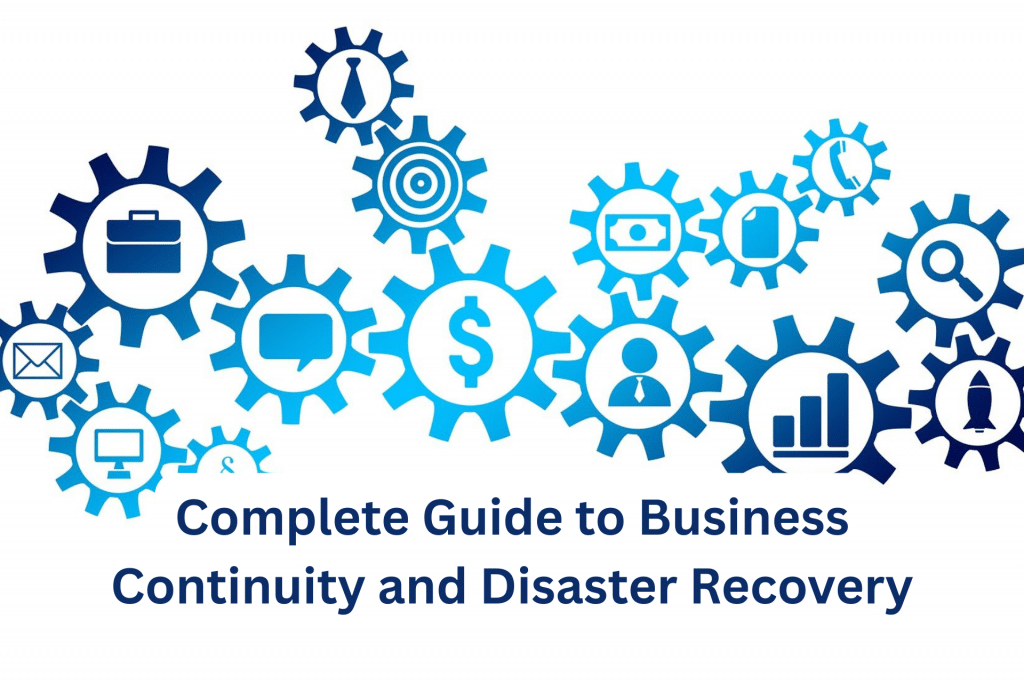Anything can happen at any time, with very little to no warning at all. Because of this, business operations can be stopped whether by a cyberattack, natural disaster, social unrest, or power outage. Unfortunately, the consequences if you and your business do not have enough preparation for these eventualities are not just financial loss. More damaging effects include reputational damage and loss of customer trust and loyalty that can lead to closure. This is why all businesses must have a reliable managed IT support provider that also offers an effective disaster recovery and business continuity services.

Complete Guide to Business Continuity Services and Disaster Recovery
What Is Business Continuity?
Business continuity has the capacity to keep operations going during and after an interruption. It is dedicated to the preservation of basic services, data protection, and downtime reduction. Simply put, it is your safety net. The correct plan will help your business to survive all those hardships without losing customers and financial stability.
What Is Disaster Recovery?
Business continuity involves disaster recovery. It deals with the recovery of IT systems, data, and technology following an incident. This means keeping the whole operation going. On the other hand, disaster recovery keeps your digital backbone intact in time. This will consist of servers, networks, and critical applications working together in sync and in perfect coordination.
Why Disaster Recovery and Business Continuity Services Are Essential
Some are ready to do one but forget the other. That is a common mistake especially for business owners who would DIY their IT services. The lack of recovery through continuity exposes your technology to danger. On the other hand, discontinuity in recovery puts your operations at risk. The two of them form a complete shield. They should be treated as a single risk management strategy by the executives and operations managers. That is the reason why it would be best to have your trusted managed IT support partner to provide you with their effective disaster recovery and business continuity services.
Key Steps to Building a Plan
Evaluate Risks and Vulnerabilities
Begin by determining the largest threats to your business to know what kinds of business continuity services you need. These may include cyberattacks, data breach, power issues, natural disasters common in your area, and disruption in your supply chain. Being aware of risks that are realistic for your specific business aids in prioritizing and resource allocation.
Determine Essential Operations
All processes are not equally important. Because of this, you need to choose the functions that have to remain operational. Some of the common priorities include customer support, payment systems, and order fulfillment. Other companies include inventory and supply chain as priorities as well.
Planning Response Staffing
Creating and developing clear procedures for maintenance of essential functions in the event of disruption is imperative. This means you also allocate responsibilities to staff, create clear communication channels, and identify backup procedures. There must also be a protocol regarding reporting the incident as per government regulation.
Develop a Disaster Recovery Plan
There should be a tangible and accessible procedural outline of how the restoration of IT systems and data can commence. With this, you and your team can reduce downtime by using secure backup, cloud, and redundancy.
Test and Update Regularly
Your business continuity services and disaster recovery plans are not effective until they are tested. Hence, make sure to simulate and test regularly. Additionally, with each test result, improve your strategy and weaknesses as your business changes.
Best Practices for Success
o Use Automation: Backup and detection tools are cloud-based and automated. Hence, minimizing human errors.
o Train Employees: The employees are supposed to be aware of their roles in case of disruptions.
o Focus on Communication: In the event of a downtime, communication must stay open. This means customers, employees, suppliers, and stakeholders are made aware of the situation as soon as safely possible.
o Collaborate with Professionals: Having a team of experts to set this up and guide you through the process will guarantee that there are no loopholes in planning.
The Role of Business Continuity Services
Operations managers and C- level executives are usually limited in terms of time and resources. The burden can be reduced by collaborating with business continuity services providers.
These professionals provide detailed risk analysis, strategy formulation, and technology services that meet your industry requirements. EB Solution, a reputable Canadian IT partner, is one example of a company that assists with business design and implementation of custom-made strategies to both safeguard operations and technology.
Advantages of Having a Strong Plan
Companies that have tested business continuity and recovery strategies are ensured to have shorter recovery periods that minimize downtime and losses. It also means you are compliant with industry and government requirements on data security. Moreover, with a short downtime, you exude reliability to your customer hence improving your business reputation and strengthening client loyalty. Lastly, with a strong business continuity and disaster recovery plan, you decrease financial losses associated with interruptions and even gain more income from repeat transactions with customers with increased loyalty to your business.
To put it briefly, planning today will save money, improve reputation, reliability, and stability tomorrow.
Moving Forward with EB Solution’s Approach
Here at EB Solution, the emphasis is on the development of resilient businesses in Canada. Our team offers IT support, cybersecurity, and recovery plans that are custom fit to your needs and requirements. The integration of technology and industry knowledge enables EB Solution to enable organizations to reduce risks and gain confidence in their continuity plans. With the inevitability of business disruption, a quick disaster recovery and business continuity plan is your shield from its negative effects. With an effective business continuity and disaster recovery plan, you will be able to preserve your operations, secure your data, and save your reputation.
